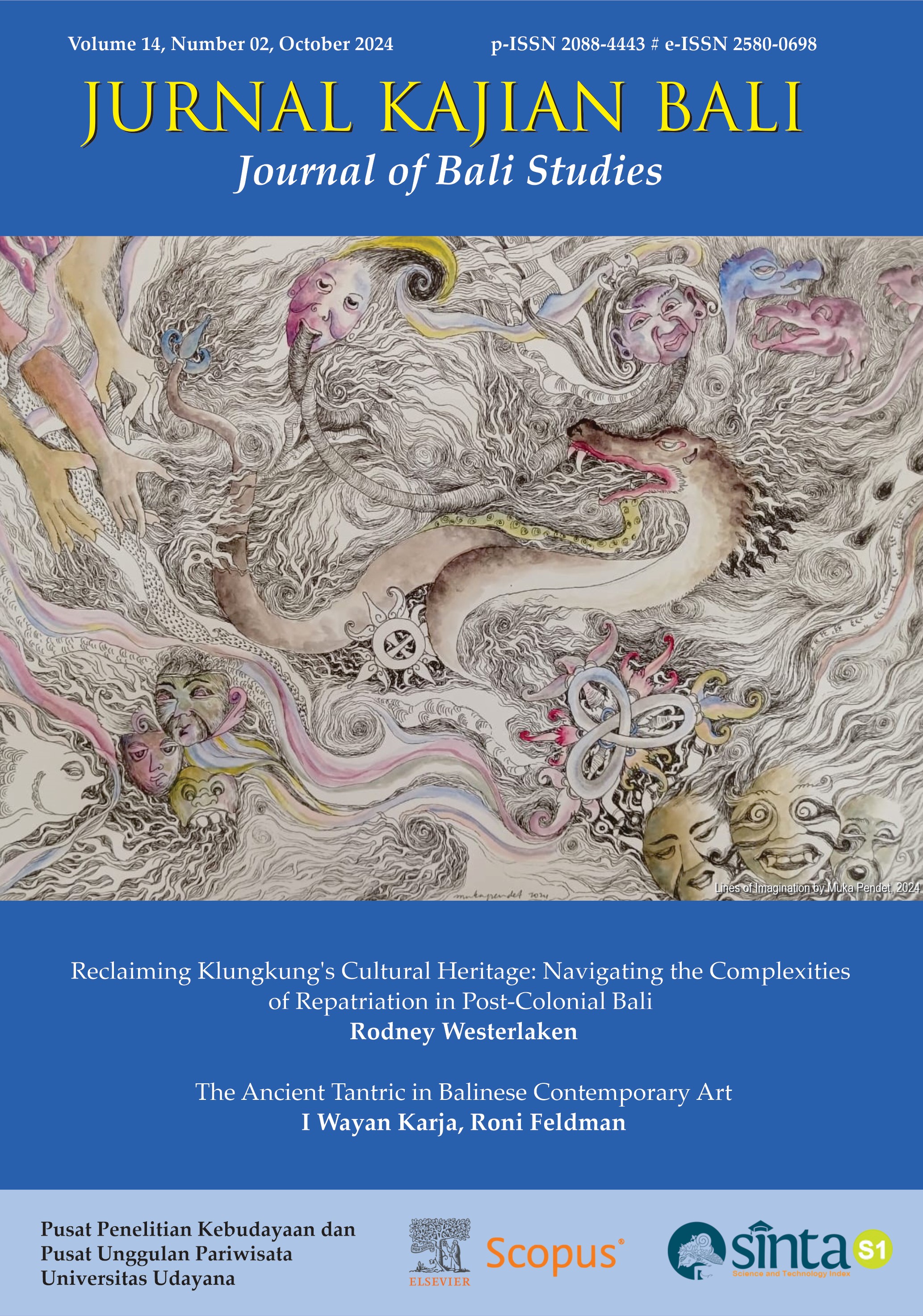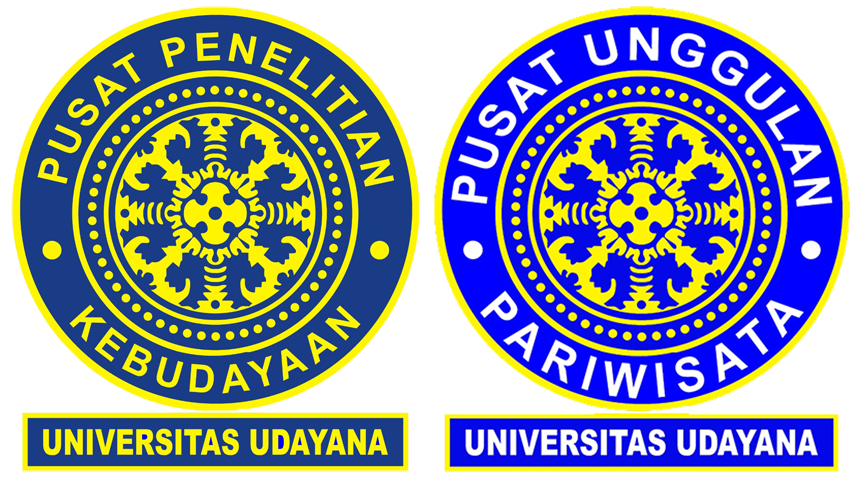Conflict and Harmony Between Desa Adat and the Bali Provincial Government Following the Enactment of the Regional Regulation on Customary Village 2019
Abstract
The Bali Provincial Government collaborates with desa adat (customary village) to enhance their strength and resilience, notably through the enactment of Province of Bali Regulation Number 4 of 2019. However, excessive regulatory impact may diverge from this goal. This study explores the ideological framework shaping interactions between desa adat and the government post-regulation. Using a qualitative methodology, data were collected through literature review, observations, and in-depth interviews. The findings draw on theories of hegemony, ideology, discourse, and the power of knowledge. Hidden ideologies of power, capital, and religion influence these interactions. The regulation's uniform framework on diverse desa adat leads to resistance and inefficiency, reflecting hegemonic control and the use of ideology and knowledge to legitimize power. This article contributes to developing legislation that empowers the desa adat while maintaining their unique characteristics.
Downloads
References
Ardhana, I. K. dkk. (2020). Pemetaan Tipologi dan Karakteristik Desa Adat di Bali. Denpasar: Cakra Media Utama.
Arjaya, I. M. (2022). The Strength of Traditional Villages in Managing Coastal Areas in Bali. Law Doctoral Community Service Journal, 1(1), pp. 54-59.
.
Atmaja, G. M.W. & Dewi, A.A.I.A. (2004). Desa Adat Sebagai Kesatuan Masyarakat Hukum Adat Bali. Dalam Hukum Adat dan Desa Adat di Bali. Editor Wayan P. Windia. Cetakan Pertama. Denpasar: Udayana University Press.
Barker, C. (2004). Cultural Studies Teori dan Praktek. Yogyakarta: Kreasi Wacana.
Eka Suadnyana, I. B. (2020). Desa Pakraman Sebagai Lembaga Adat dan Lembaga Agama Bagi Kehidupan Masyarakat Hindu di Bali. Dharma Duta, 18(1), 21-32. https://doi.org/10.33363/dd.v18i1.446.
Foucault, M. (1981). The Order of Discourse. London: Routledge.
Gramsci, A. (2001). Catatan-Catatan Politik. Surabaya: Pustaka Promethea
J.A.C. Vel & A.W. Bedner. (2015). Decentralisation and village governance in Indonesia: The Return to the Nagari and the 2014 Village Law. The Journal of Legal Pluralism and Unofficial Law, 47:3, 493-507.
Kumbara, A.A.N. (2021). Paradigma Teori-Teori Studi Budaya. Denpasar: Swasta Nulus.
Larrain, J. (1996). Konsep Ideologi (terjemahan). Yogyakarta: LKPSM.
Loic J. D. W. (1989). Towards a Reflexive Sociology: A Workshop with Pierre Bourdieu. Sociological Theory, 7, Accessed on 16 April 2024, from JSTOR, https://doi.org/10.2307/202061.
Macey, W. H., & Schneider, B. (2008). The Meaning of Employee Engagement. Industrial and Organizational Psychology: Perspectives on Science and Practice, 1(1), 3–30.
Nordholt, H. S. (2006). The Spell of Power Sejarah Politik Bali 1650-1940. Jakarta: KITLV.
Pitana, I. G. (Ed). (1994). Dinamika Masyarakat dan Kebudayaan Bali. Denpasar: Bali Post.
Putra, I. N. D. (2014). Bali: Between Cultural and Marine Tourism. Jurnal Kajian Bali (Journal of Bali Studies), 4(1), pp. 15-30.
Putra, I. N. D & Creese, H. (2016). Negotiating Cultural Constraints: Strategic Decision-Making by Widows and Divorcees (Janda) in Contemporary Bali, Indonesia and The Malay World, 44:128, 104-122. https://doi.org/10.1080/13639811.2015.1100869
Putri Wirantari, I. D. A. (2024). Sistem Pemerintahan Ulu-Apad Berdasarkan Perda No 4 Tahun 2019 di Provinsi Bali Dalam Penanganan Covid-19 Studi Kasus: Desa Songan Kintamani. Ethics and Law Journal: Business and Notary,2, 238-242. DOI: 10.61292/ELJBN.126
Sari, I.A.L. & Putra, I. N. D. (2020). Narrative on Nature Conservation: A Comparative Study of The Folktales of Bali Aga and Ainu. KEMANUSIAAN the Asian Journal of Humanities 27(2): 59–78.
Sari, N., Intan Pinatih, D., Juniarta, I., & Supriliyani, N. (2022). Dualitas Sekala-Niskala dalam Pararem Gering Agung: Memahami Penanganan Covid-19 Berbasis Adat dari Perspektif Kebijakan Publik di Bali. Jurnal Kajian Bali (Journal of Bali Studies), 12(1), 43-68.
Simon, R. (2004). Gagasan Gagasan Politik Gramsci. Yogyakarta: INSIST bekerjasama dengan Pustaka Pelajar.
Suyadnya, I. W. (2021). Interaksi Kekuasaan Adat dan Negara dalam Perspektif Masyarakat Bali Kuno Tenganan Pegringsingan. Jurnal Kajian Bali (Journal of Bali Studies), 11(2), 517-538. https://doi.org/10.24843/JKB.2021.v11.i02.p15
Takwin, B. (2009). Akar-Akar Ideologi Pengantar Kajian Konsep Ideologi dari Plato Hingga Bourdieu. Yogyakarta: Jalasutra.
Thompson, J. B. (2003). Kritik Ideologi Global. Terjemahan Haqqul Yaqin. Yogyakarta: IRCISOD.
Yulianingsih, W., Indawati, Y., & Kartika, A. W. (2021). “Awig-Awig as traditional law written in traditional law perspective in Indonesia”. 5th International Seminar of Research Month 2020. NST Proceedings. pages 189-194. Accessed on 16 April 2024, doi: 10.11594/ nstp.2021.0929
Zaenudin, D. (2020). Kondisi Modal Sosial dan Kelembagaan Ekonomi Adat. Dalam Pemetaan Tipologi dan Karakteristik Desa Adat di Bali. Cetakan Pertama. Denpasar: Cakra Media Utama.

This work is licensed under a Creative Commons Attribution 4.0 International License.



















